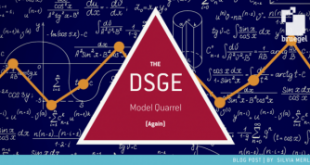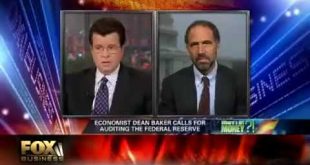Read More »
DSGE models — overconfident macroeconomic story-telling
from Lars Syll A recent paper by Christiano, Eichenbaum and Trabandt (C.E.T.) on Dynamic Stochastic General Equilibrium Models (DSGEs) has generated quite a reaction in the blogosphere … Bradford Delongpoints out that new Keynesian models were constructed to show that old Keynesian and old Monetarist policy conclusions were relatively robust, and not blown out of the water by rational expectations … The DSGE framework was then constructed so that new Keynesians could talk to RBCites. None...
Read More »Inter-generational wealth redistribution in the USA 1989 to 2016
Top 10% national income share across the world 1980 to 2016
Source: http://wir2018.wid.world/executive-summary.html
Read More »China’s “Currency Devaluation Game”
from Dean Baker Donald Trump was apparently angry about the value of the Russian ruble and the Chinese yuan against the dollar. He complained in a tweet that both are playing the “Currency Devaluation game” in a tweet yesterday. Neil Irwin rightly points out that the complaint against Russia is bizarre, both because we don’t have much trade with Russia, but also because the most obvious reason its currency is falling is sanctions pushed by the United States and other western countries....
Read More »Shortcomings of regression analysis
from Lars Syll Distinguished social psychologist Richard E. Nisbett has a somewhat atypical aversion to multiple regression analysis. In his Intelligence and How to Get It (Norton 2011) he writes: Researchers often determine the individual’s contemporary IQ or IQ earlier in life, socioeconomic status of the family of origin, living circumstances when the individual was a child, number of siblings, whether the family had a library card, educational attainment of the individual, and other...
Read More »Debt and taxes
from David Ruccio As federal deficits and debt grow, they end up receiving, not paying for, a larger and larger share of federal expenditures. Tax cuts and spending increases enacted by Republicans over the past four months will lead to wider than previously expected budget deficits, according to the Congressional Budget Office. The federal budget deficit would total $804 billion this year, 43 percent higher than it had projected last summer, and exceed $1 trillion a year starting in...
Read More »Economist Dean Baker On Fox, Audit The Federal Reserve!
Economist Dean Baker On Fox, Audit The Federal Reserve!
Read More »A typology of uncertainties
from J.-C. Spender There is some heavy stuff in this section – but we cannot get beyond today’s literature on managing as rational decision-making and connect with managers’ practice without engaging uncertainty. All attempts to define uncertainty must fail – by definition, for to define is to take as certain, axiomatic. Those who see uncertainty in terms of probability stand on the certainty of population statistics. Knight saw such modified certainty as ‘risk’. Yes, risk management is...
Read More »Dysfunctionalism in US economic departments and business schools
from John Locke The problem, however, is not the failure of economic departments and business schools to create a prescriptive science, but the refusal of nomothetic neoclassical economists and mathematical modelers in them to admit the failure, and their actions after they gained a monopoly of the sinews of institutional power, that produced dysfunctionality in Anglo American higher education. That dysfunctionalism is expressed in their constant battle with people in academia who realize...
Read More » Real-World Economics Review
Real-World Economics Review







